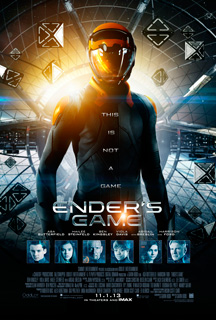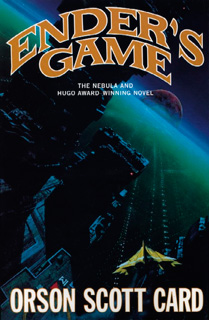The Movie vs. The Book
Permanent link All Posts

“The movie is never as good as the book.”
Sigh.
I’ve been hearing this for years, and as a huge fan of movies, it’s frustrating. To me, that phrase is about as cliché as “never judge a book by its cover.” Some books can be judged accurately by their covers, just as some movies honor the book on which they’re based.
With the long-awaited film adaptation of Orson Scott Card’s contemporary sci-fi classic Ender’s Game in theaters this weekend, I’m bracing to hear those words a lot. Published in the ‘80s, the book was long-considered un-filmable. It combines gravity-defying action with a coming-of-age story with elements of a political thriller – and a lot happens on a computer screen. Even though the reviews have leaned positive so far, for some, filmmaker Gavin Hood’s interpretation will never measure up to their expectations.
My friend and fellow Oy!Chicago blogger Lia perfectly sums up people's unrealistic expectations of movies adaptations of books in a blog post she wrote when fans of The Hunger Games were voicing their disappointment with certain aspects of the film. If a book were committed to film exactly as it is on the page (or even close to that way), you would be bored out of your freaking mind and hate it. I promise. And no movie is going to turn out exactly as you imagined the book to be – you didn’t direct it.
Back when I was first able to read and could enjoy a book that actually had a movie version, I held the movie accountable for most everything in the book – and I was frequently disappointed.
In third grade, for example, we read Roald Dahl’s James and the Giant Peach in class. When we discovered that the movie version would be coming out just months later, we begged for a field trip to see it and our teachers gave in. We were ecstatic! We couldn’t wait to see our favorite parts come to life. Many of us especially loved the chapter when the giant peach flies through the sky and crosses paths with the Cloud-Men, creatures who control the weather, and James and his insect friends instigate a little fight.
Nothing could temper the excitement of being in a movie theater with dozens of our classmates – except that as we watched the movie, we waited and waited only to never see any Cloud-Men. This treachery was utterly devastating to our 9-year-old imaginations, which longed to see the Cloud-Men brought to life. Why would they leave out the best part?
Nearly 20 years and hundreds of movies later, I can actually tell you why. I don’t think it would’ve been practical for Henry Selick, director of The Nightmare Before Christmas, who made this film by slowly moving solid clay figurines a millimeter at a time, to film a sequence in which a peach flies through the air and gets attacked by ghost-like Cloud-Men. Today, it definitely would have been easier to do with the help of some digital effects shots, but not in the early ‘90s.
We are lucky to live in an age when digital effects can help bridge the gap between what’s on the page and what turns up on screen. Movies are no longer as limited by what is or isn’t possible when adapting a book into a movie. This explains – visually at least – why movie versions have done books justice more often than they did before the 21st Century.
Consequently, movies and television continue to increase books’ popularity and vice-versa. The Hunger Games, Twilight, Game of Thrones – people are happy to consume their favorite story in every form possible. And everyone has their own best practices: they refuse to watch the movie if they’ve read the book or they have to read the book before seeing the movie or they never want to read a book before they see a movie – the iterations are endless.
I prefer to read books before I see movies, though time rarely affords it. As someone who has seen and read a lot, I feel like I know what qualities make up a good book versus a good movie, and I can manage my expectations. I never assume the quality of one will simply transfer to the other.
In our multimedia world, many people forget the obvious: books and movies are different forms of storytelling. Books bring us perspectives that movies can’t, while movies show us things no words can truly describe. If you can’t embrace the differences, it’s going to be hard to like anything as much as whichever you consume first.
As someone fascinated by storytelling, I love to consume the original source (usually the book) before the interpretation. What was taken out or what was added into a film version is an artistic choice, not a decision of whether to be loyal to the source or not. By taking out this part of the book, has the filmmaker made the film more concise and easy to watch or removed something essential? By adding a new scene, how does this add greater meaning to the story or does it simply distract from it? I love to decipher the artistic motivation and choices behind the discrepancies between books and films and make a determination of whether, in my opinion, the interpretation works or doesn’t.
Forgive me, I’m a story nerd. Whichever way you prefer to consume books and their movie counterparts, it doesn’t matter. But you’ll be happier the more you learn to appreciate the differences.



.jpg)



